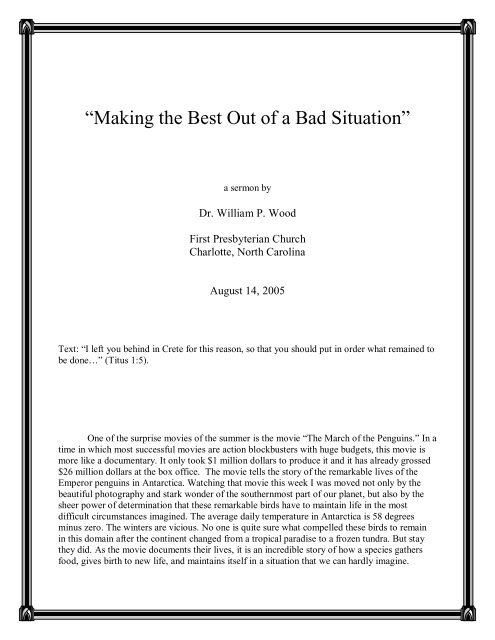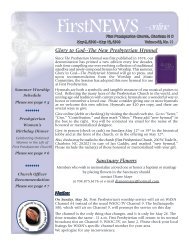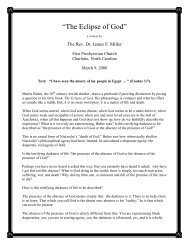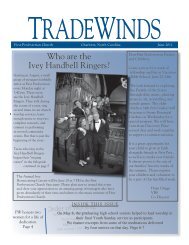“Making the Best Out of a Bad Situation” - First Presbyterian Church
“Making the Best Out of a Bad Situation” - First Presbyterian Church
“Making the Best Out of a Bad Situation” - First Presbyterian Church
Create successful ePaper yourself
Turn your PDF publications into a flip-book with our unique Google optimized e-Paper software.
<strong>“Making</strong> <strong>the</strong> <strong>Best</strong> <strong>Out</strong> <strong>of</strong> a <strong>Bad</strong> <strong>Situation”</strong><br />
a sermon by<br />
Dr. William P. Wood<br />
<strong>First</strong> <strong>Presbyterian</strong> <strong>Church</strong><br />
Charlotte, North Carolina<br />
August 14, 2005<br />
Text: “I left you behind in Crete for this reason, so that you should put in order what remained to<br />
be done…” (Titus 1:5).<br />
One <strong>of</strong> <strong>the</strong> surprise movies <strong>of</strong> <strong>the</strong> summer is <strong>the</strong> movie “The March <strong>of</strong> <strong>the</strong> Penguins.” In a<br />
time in which most successful movies are action blockbusters with huge budgets, this movie is<br />
more like a documentary. It only took $1 million dollars to produce it and it has already grossed<br />
$26 million dollars at <strong>the</strong> box <strong>of</strong>fice. The movie tells <strong>the</strong> story <strong>of</strong> <strong>the</strong> remarkable lives <strong>of</strong> <strong>the</strong><br />
Emperor penguins in Antarctica. Watching that movie this week I was moved not only by <strong>the</strong><br />
beautiful photography and stark wonder <strong>of</strong> <strong>the</strong> sou<strong>the</strong>rnmost part <strong>of</strong> our planet, but also by <strong>the</strong><br />
sheer power <strong>of</strong> determination that <strong>the</strong>se remarkable birds have to maintain life in <strong>the</strong> most<br />
difficult circumstances imagined. The average daily temperature in Antarctica is 58 degrees<br />
minus zero. The winters are vicious. No one is quite sure what compelled <strong>the</strong>se birds to remain<br />
in this domain after <strong>the</strong> continent changed from a tropical paradise to a frozen tundra. But stay<br />
<strong>the</strong>y did. As <strong>the</strong> movie documents <strong>the</strong>ir lives, it is an incredible story <strong>of</strong> how a species ga<strong>the</strong>rs<br />
food, gives birth to new life, and maintains itself in a situation that we can hardly imagine.
1st <strong>Presbyterian</strong> <strong>Church</strong> Page 2 August 14, 2005<br />
I.<br />
There is a text in Paul’s letter to his friend Titus that has always caught my imagination.<br />
Paul, so <strong>the</strong> record has it, had left Titus on <strong>the</strong> great island <strong>of</strong> Crete in <strong>the</strong> eastern Mediterranean<br />
Sea. Apparently, this was not a very pleasant place to be. The situation is summed up in one<br />
blistering verse <strong>of</strong> this letter. “It was one <strong>of</strong> <strong>the</strong>m,” says Paul, “<strong>the</strong>ir very own prophet, who said,<br />
“Cretans are always liars, vicious brutes, and lazy gluttons. That testimony is true.” That is<br />
Paul’s summary <strong>of</strong> <strong>the</strong> situation in Crete.<br />
But listen to him as he writes to Titus: “For this reason I left you behind in Crete, so that<br />
you should put in order what remained to be done” (Titus 1:5).<br />
That seems like a strange reason for leaving a person in Crete, that <strong>the</strong> Cretans are always<br />
liars, evil beasts, and idle gluttons. It sounds like a good reason for getting out <strong>of</strong> Crete. But Paul<br />
was no ordinary person. He never backed away from a difficult situation or a great challenge.<br />
There is in this assessment something that smacks <strong>of</strong> Christianity at its best: Crete--a hard place;<br />
<strong>the</strong> Cretans--a bad lot. “For this reason I left you in Crete.”<br />
Now, I believe that <strong>the</strong> experience <strong>of</strong> Titus is one with which many <strong>of</strong> us can identify.<br />
We have all been to Crete; we are all going to be in Crete, and probably a good number <strong>of</strong> us<br />
are <strong>the</strong>re today. Crete is a situation that seems hopeless. It can be a dead-end job or a family<br />
situation that seems overwhelming. It can be a medical situation that seems to <strong>of</strong>fer no real hope<br />
<strong>of</strong> recovery. The reality is that when we find ourselves in this kind <strong>of</strong> situation we want out. Can<br />
you imagine what Titus thought, when after pouring his heart out about how bad Crete was, he<br />
received this message: “For this reason I have left you in Crete.” So, what happens to a person<br />
when he or she finds himself or herself in a bad situation?<br />
One <strong>of</strong> <strong>the</strong> things that we sometimes discover is that difficult situations can be <strong>the</strong><br />
occasion in which people find <strong>the</strong>ir real vocation. When Titus found himself in Crete, he must<br />
have felt his life was over. After all <strong>the</strong> Cretans were “liars, brutes, and gluttons.” How in <strong>the</strong><br />
world does a person have a ministry in a place that that?<br />
II.<br />
Some years ago I had <strong>the</strong> opportunity to visit <strong>the</strong> Island <strong>of</strong> Crete. It is a beautiful gem in<br />
<strong>the</strong> midst <strong>of</strong> <strong>the</strong> Mediterranean. One <strong>of</strong> <strong>the</strong> things that impressed me was <strong>the</strong> archaeological<br />
excavations that were going on in Crete. They were excavating <strong>the</strong> foundations <strong>of</strong> beautiful<br />
churches that dated back to <strong>the</strong> time <strong>of</strong> <strong>the</strong> Roman Empire. <strong>Out</strong> <strong>of</strong> Crete came a number <strong>of</strong><br />
teachers, preachers, and missionaries who fought mightily against <strong>the</strong> paganism <strong>of</strong> <strong>the</strong> Roman<br />
Empire. Whose name was on those churches? Titus! Whose shrines were built <strong>the</strong>re? Titus!<br />
Saint Titus! In <strong>the</strong> very place from which he wanted to flee he found something he would have<br />
never expected--an opportunity to make a powerful witness for <strong>the</strong> Christian faith. Paul was<br />
right. “I left you behind in Crete for this reason, so that you should put in order what remained to<br />
be done….” (Titus 1:5).
Surely, this is a principle that runs through life. Life is not just what we find; it is what<br />
we created. Many people wander through life never understanding this. Existence is what you<br />
find; life is what you create.<br />
This summer I had <strong>the</strong> chance to read David McCullough’s wonderful book 1776. It is<br />
<strong>the</strong> story <strong>of</strong> that critical year in <strong>the</strong> life <strong>of</strong> our nation when <strong>the</strong> War <strong>of</strong> Independence began. It<br />
was <strong>the</strong> year <strong>of</strong> <strong>the</strong> signing <strong>of</strong> <strong>the</strong> Declaration <strong>of</strong> Independence. Most <strong>of</strong> us look back on that<br />
year as if it were a year <strong>of</strong> glorious victories. As McCullough points out, it was anything but<br />
easy. When George Washington took charge <strong>of</strong> <strong>the</strong> Continental Army, he found an army that<br />
was unfed, unclo<strong>the</strong>d, and undisciplined. In his letters to his wife Martha he expressed his great<br />
dismay that <strong>the</strong>re was any hope for victory against an overwhelming British army. And yet, out<br />
<strong>of</strong> that great struggle came <strong>the</strong> birth <strong>of</strong> a nation “<strong>of</strong> <strong>the</strong> people, by <strong>the</strong> people, and for <strong>the</strong><br />
people.”<br />
There is a sense in which all <strong>of</strong> us are faced with <strong>the</strong> same struggle that faced Titus in<br />
Crete. So <strong>of</strong>ten we are dealt a hand that seems unfair. So <strong>of</strong>ten we face situations we would have<br />
never imagined or chosen. That is why each <strong>of</strong> us needs to search our souls to see if we can find<br />
what Titus found: a great faith, a firm conviction, and inward power.<br />
1st <strong>Presbyterian</strong> <strong>Church</strong> Page 3 August 14, 2005<br />
III.<br />
Then, too, <strong>the</strong>re is something else about Titus’ experience in Crete. This principle <strong>of</strong><br />
making <strong>the</strong> best <strong>of</strong> difficult situations is not only a common human situation; it is at <strong>the</strong> heart <strong>of</strong><br />
our faith as Christians. There is no use <strong>of</strong> pretending to be a disciple <strong>of</strong> Jesus Christ if we are<br />
unwilling to stay in Crete because it is difficult. Jesus belongs in Crete. He particularly belongs<br />
in Crete. He belongs in Crete not in spite <strong>of</strong> <strong>the</strong> fact that Cretans are liars, beasts, gluttons, but<br />
because <strong>the</strong>y are. “This man receives sinners, and eats with <strong>the</strong>m.” said Jesus’ enemies. He was<br />
always trying to discover Crete. That was always one <strong>of</strong> <strong>the</strong> annoying things about Jesus. “I<br />
came,” he said, “not to call <strong>the</strong> righteous, but sinners.”<br />
There is something very powerful about <strong>the</strong> ability <strong>of</strong> a person to take a terrible situation<br />
and make <strong>of</strong> it something noble. Gary Wills in his book, Lincoln at Gettysburg, makes <strong>the</strong> point<br />
that in <strong>the</strong> 272 words that Abraham Lincoln spoke in November <strong>of</strong> 1863 he <strong>of</strong>fered <strong>the</strong> American<br />
people <strong>the</strong> opportunity to move beyond a terrible war to a new future.<br />
The Battle <strong>of</strong> Gettysburg was a disaster in almost every sense <strong>of</strong> that word. Fifty<br />
Thousand soldiers were killed <strong>the</strong>re in battle. It was one <strong>of</strong> <strong>the</strong> worst carnages in American<br />
history.<br />
Not even all <strong>the</strong> gallantry <strong>of</strong> General Robert E. Lee could redeem his foolhardiness at<br />
Gettysburg. When in doubt, he charged into <strong>the</strong> cannon’s mouth by proxy. Ordered afterward to<br />
assemble <strong>the</strong> ruins <strong>of</strong> that doomed assault, General George Pickett told Lee that he had no force<br />
to reassemble. Lee <strong>of</strong>fered Jefferson Davis his resignation.
Nor did Major General Meade, Lee’s opposite number, leave Gettysburg in glory.<br />
Though he had lost as many men as had Lee, he had <strong>the</strong> opportunity to capture <strong>the</strong> Confederate<br />
Army, but failed to take advantage <strong>of</strong> that opportunity. He, too, <strong>of</strong>fered his resignation.<br />
When Lincoln arrived at Gettysburg, he was not even <strong>the</strong> featured speaker. That honor<br />
was reserved for Edward Everett. Lincoln’s presence was somewhat <strong>of</strong> an afterthought. But <strong>the</strong><br />
opportunity was not lost on Lincoln. Everett spoke for over an hour. Lincoln spoke for three<br />
minutes. Yet, in those three minutes he lifted <strong>the</strong> eyes <strong>of</strong> a nation above <strong>the</strong> carnage and division<br />
<strong>of</strong> war to <strong>the</strong> possibility <strong>of</strong> reconciliation.<br />
Through <strong>the</strong> years historians have struggled to understand Abraham Lincoln’s great<br />
contribution to this nation. In many ways he seems a very unlikely candidate for greatness. He<br />
had failed in business and in politics. His wife, Mary, was a very troubled woman and Lincoln<br />
himself struggled with depression and sudden mood changes. And, yet, in <strong>the</strong> darkest hour <strong>of</strong> our<br />
history he was <strong>the</strong> one person who was able to take a terrible situation and make <strong>of</strong> it something<br />
very great.<br />
1st <strong>Presbyterian</strong> <strong>Church</strong> Page 4 August 14, 2005<br />
IV.<br />
Then, too, if a person is going to make <strong>the</strong> best <strong>of</strong> a terrible situation, it will be because<br />
he or she discovered a faith in God that gave <strong>the</strong> power to see that person through. Perhaps we<br />
have not been fair to Titus. He was in a difficult spot. The citizens <strong>of</strong> Crete were liars, beasts,<br />
and gluttons. He had every reason to want to get out <strong>of</strong> Crete and none <strong>of</strong> us would have blamed<br />
him if he had left. But he didn’t. He stayed and in doing so he fulfilled <strong>the</strong> words <strong>of</strong> Paul: “For<br />
this reason I have left you in Crete.”<br />
It is always easier to denounce something than to build something. Consider <strong>the</strong> church,<br />
for example. Many people today criticize <strong>the</strong> church. Several weeks ago <strong>the</strong> Charlotte Observer<br />
ran an article on “Why People Don’t Go to <strong>Church</strong> Today.” Most <strong>of</strong> us could have written that<br />
article. We know <strong>the</strong> reasons. The church has failed in many ways. Often it seems little more<br />
than a pale reflection <strong>of</strong> <strong>the</strong> society around it. People today in <strong>the</strong> <strong>Presbyterian</strong> <strong>Church</strong> (U.S.A.)<br />
are angry about many things. Some are angry because it is too conservative; o<strong>the</strong>rs because it is<br />
too liberal. It isn’t difficult to criticize <strong>the</strong> church. It is a very human institution. But it is<br />
something more than that, it is also <strong>the</strong> ‘body <strong>of</strong> Christ’ and because it is <strong>the</strong> “body <strong>of</strong> Christ,” it<br />
is our responsibility not to complain about it “but to set in order <strong>the</strong> things that need to be done.”<br />
As I have said before, I believe that <strong>First</strong> <strong>Presbyterian</strong> <strong>Church</strong> is facing one <strong>of</strong> <strong>the</strong><br />
greatest opportunities we have ever faced. The face <strong>of</strong> Uptown is changing. A new basketball<br />
arena will be complete in <strong>the</strong> next several months, as will ImaginOn: <strong>the</strong> Joe and Joan Martin<br />
Center, combining <strong>the</strong> resources <strong>of</strong> <strong>the</strong> Children’s library and <strong>the</strong> Children’s Theater. Moreover,<br />
<strong>the</strong>re are few churches, if any, in this city that have <strong>the</strong> capacity to influence <strong>the</strong> entire shape <strong>of</strong><br />
this city.
There are those who look at <strong>the</strong> city <strong>of</strong> Charlotte in <strong>the</strong> same way Titus looked at Crete.<br />
Charlotte, <strong>the</strong>y say, can’t make its schools work, can’t create racial harmony, can’t solve <strong>the</strong><br />
growing disparity solve <strong>the</strong> great divide between rich and poor.<br />
That sounds like a good reason to get out <strong>of</strong> Charlotte. But that is not our charge. Our<br />
charge is to transform it, ‘that we may put into order what remains to be done.’<br />
Amen!<br />
1st <strong>Presbyterian</strong> <strong>Church</strong> Page 5 August 14, 2005





